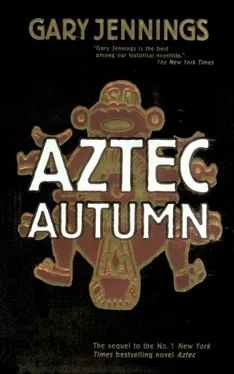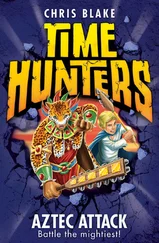Gary Jennings - Aztec Autumn
Здесь есть возможность читать онлайн «Gary Jennings - Aztec Autumn» весь текст электронной книги совершенно бесплатно (целиком полную версию без сокращений). В некоторых случаях можно слушать аудио, скачать через торрент в формате fb2 и присутствует краткое содержание. Жанр: Старинная литература, на английском языке. Описание произведения, (предисловие) а так же отзывы посетителей доступны на портале библиотеки ЛибКат.
- Название:Aztec Autumn
- Автор:
- Жанр:
- Год:неизвестен
- ISBN:нет данных
- Рейтинг книги:4 / 5. Голосов: 1
-
Избранное:Добавить в избранное
- Отзывы:
-
Ваша оценка:
- 80
- 1
- 2
- 3
- 4
- 5
Aztec Autumn: краткое содержание, описание и аннотация
Предлагаем к чтению аннотацию, описание, краткое содержание или предисловие (зависит от того, что написал сам автор книги «Aztec Autumn»). Если вы не нашли необходимую информацию о книге — напишите в комментариях, мы постараемся отыскать её.
Readers familiar with Mexican history will welcome the rich details of this vengeance drama; those new to it will be impressed by Jennings's exhaustive research.
Aztec Autumn — читать онлайн бесплатно полную книгу (весь текст) целиком
Ниже представлен текст книги, разбитый по страницам. Система сохранения места последней прочитанной страницы, позволяет с удобством читать онлайн бесплатно книгу «Aztec Autumn», без необходимости каждый раз заново искать на чём Вы остановились. Поставьте закладку, и сможете в любой момент перейти на страницу, на которой закончили чтение.
Интервал:
Закладка:
The single small distinction G'nda Ké was accorded in Bakúm was the permission, when she was not at some other labor, to sit as interpreter between me and the five old yo'otuí. There she could speak, at least, and—since I never learned more than a few words of the language—she almost certainly must have tried to make herself a heroine by denouncing me as a quimíchi, or an agitator of dubious motives, or anything else that might have made the elders order us outlanders ousted or executed. But this much I know: There is no word for heroine in the Yaki tongue, no concept of any such kind of woman in the Yaki mind. If G'nda Ké did desperately try that tactic, I am sure the yo'otuí heard her rantings as nothing but woman-wind to be ignored. If she did insist that we Aztéca be exterminated, and if the old men took any notice at all, they would perversely have done just the opposite. So it may have been thanks to another of G'nda Ké's attempts at perfidy that the yo'otuí not only let me stay and speak my message but also listened attentively to me.
I should explain how those yo'otuí governed—if governed is the word—for the Yaki system was unique in The One World. Each of the old men was responsible for one ya'úra, meaning "function," of the five ya'úram of his village: religion, warfare, work, customs and dance. Necessarily, some of their duties overlapped, while others were scarcely required at all. The elder in charge of work, for example, had little to do but punish any female malingerer, and such a woman simply did not exist in Yaki society. The elder in charge of warfare had only to give his blessing whenever the yoem'sontáom of his village decided to make a raid on some other, or whenever the yoem'sontáom of all the three Yaki branches combined to make their almost-ritual raids on the Desert People.
The other three old men more or less governed in concert: the Keeper of Religion, the Keeper of the Customs and the Leader of the Dances. The Yaki religion could rightly be called no religion at all, for they worship only their own ancestors, and of course anyone among them who dies becomes, that moment, an ancestor. Since the anniversary of any ancestor's death is a cause for ceremonies honoring it, hardly a night goes by in the Yaki lands without a ceremony, major or minor, depending on how important that person had been in life. The only "gods" recognized by the Yaki are their two longest-ago ancestors, scarcely real gods, but more like the Lord and Lady Pair whom we Aztéca have always believed were the first begetters of our race. We do not actively worship ours, but the Yaki call theirs Old Man and Our Mother, and venerate them most deeply.
Also, the Yaki believe that their deserving dead go to a happy and eternal afterlife, like our Tonatíucan or Tlálocan, or the Christians' heaven. They call theirs The Land Beneath the Dawn, and rather foolishly insist that it is not immeasurably far away but nearby, just east of a notched mountain peak called Takalá'im, which sits in the very middle of the Yaki lands. Where their undeserving dead go, the Yaki do not know and do not seem to care, for they can conceive of no place like our Míctlan or the Christians' hell.
They do, however, believe that they, the living, must be constantly on their guard against a whole host of invisible evil godlings or spirits called the chapáyekám. Those are the pestiferous fomenters of illness, accidents, drought, flood, defeat in battle and every other misfortune that besets the Yaki race. So, while the Keeper of Religion sees to it that his people properly honor their ancestors, all the way back to Old Man and Our Mother, the Keeper of the Customs is charged with warding off the chapáyekám. It is he who carves and colors the wooden masks intended to frighten them away, and he is continually trying to devise ever more hideous visages.
It follows that the Leader of the Dances is the busiest of the five yo'otuí, for the communal dances are considered essential to the affairs of all the other four. The village work will not get properly done, the battles will not be won, the ancestors will not be sufficiently honored and the malignant spirits will not be adequately propitiated or dispelled unless the dances are done—and done just so. The Leader himself is too old to dance, and I found it somewhat comical that all the other men, who devoted their days to rough and bloody pursuits, should spend their every night in dancing solemnly, formally, even daintily, around celebratory bonfires. (It is hardly necessary to remark that the women never took part.)
The Leader dispensed to the dancers enough peyotl to give them unflagging energy, but not enough to fuddle or frenzy them so that they missed the precise steps and figures that had been prescribed through all the ages since the Ancient Times. The Leader hovered close to keep his hawk eye on the dancers, and to yank from among them any man who made a misstep or had the impudence to introduce a new one. They danced to what they called music, made by the men too old or crippled to dance. But since they lacked the variety of instruments invented by more civilized people, what they made was, to my ears, sheer noise. They blew on cane whistles, blew through water-filled gourds, rasped notched cane stalks together, shook wooden rattles and pounded on double-headed drums. (Though there was no paucity of animal hides, those drumheads were of human skin.) And the dancers themselves added to the noise, wearing anklets of cocoons, the dead insects inside clattering at every step.
For the dances honoring Old Man and Our Mother, or more recently departed ancestors, the men wore fanlike headdresses, but fashioned either of stiff cane strips or fluttering reeds, rather than feathers. For the dances intended to repel the wicked chapáyekám, every man wore one of those gruesome carved and daubed masks, no two alike. For the dances danced to celebrate a battle victory—or to anticipate one—the men wore cóyotin skins with the dead animals' toothy heads capping their own.
Then there was a dance done by one man alone, he the acknowledged best dancer in the village. This was the performance done to attract game for the hunters, in seasons when a drought or a disease had diminished the local population of wild animals. It truly was a graceful and exciting dance, and the more enjoyable because it was done without any "music." The man wore atop his head, secured by thongs, a buck deer's head—the handsomest procurable, with an impressive rack of antlers—and he was otherwise naked, except for bracelets and anklets of cocoons and he held in either hand an intricately carved wooden rattle. These provided the only accompanying noise as he various bounded like a startled buck, capered like a carefree fawn, shuffled bent over and wary, jerking his head about, like a hunter on the prowl. He might have to do this dance to exhaustion, many nights in a row, before some scout came to report that the game had returned to their usual habitats.
The Leader of the Dances confided to me, through G'nda Ké, that the game-attracting dance was much more efficacious in accomplishing its purpose when the dancer could dance around a sacrificial "doe." That would be a human female, tightly bound inside a doeskin. After she had been danced around for the ritual length of time, she would be butchered—just as was done to a real doe—dismembered, cooked and eaten by the men, they doing much slobbering and lip-smacking, so the wild game would sense their gratitude. Unfortunately, said the Leader, the Mayo men had not recently made any female-abducting raids on any alien village, so that part of the ceremony could not be demonstrated for my admiration. There were plenty of expendable Mayo females, he conceded, but they were too tough and stale and stringy to be lip-smackingly eaten. G'nda Ké managed to look affronted and sulky even at being slighted in that regard.
Читать дальшеИнтервал:
Закладка:
Похожие книги на «Aztec Autumn»
Представляем Вашему вниманию похожие книги на «Aztec Autumn» списком для выбора. Мы отобрали схожую по названию и смыслу литературу в надежде предоставить читателям больше вариантов отыскать новые, интересные, ещё непрочитанные произведения.
Обсуждение, отзывы о книге «Aztec Autumn» и просто собственные мнения читателей. Оставьте ваши комментарии, напишите, что Вы думаете о произведении, его смысле или главных героях. Укажите что конкретно понравилось, а что нет, и почему Вы так считаете.











